Understanding Your Path to Mental Wellness Through Medicaid
Medicaid is the nation’s largest payer of mental health and substance use disorder services, providing crucial access to behavioral health care for millions of low-income Americans. Despite its vital role, many beneficiaries face difficulties in finding providers, understanding coverage options, and navigating policies. This article explores how individuals can access mental health services through Medicaid, highlighting coverage details, provider availability, policy impacts, and emerging reforms.
How to Access Mental Health Services Through Medicaid
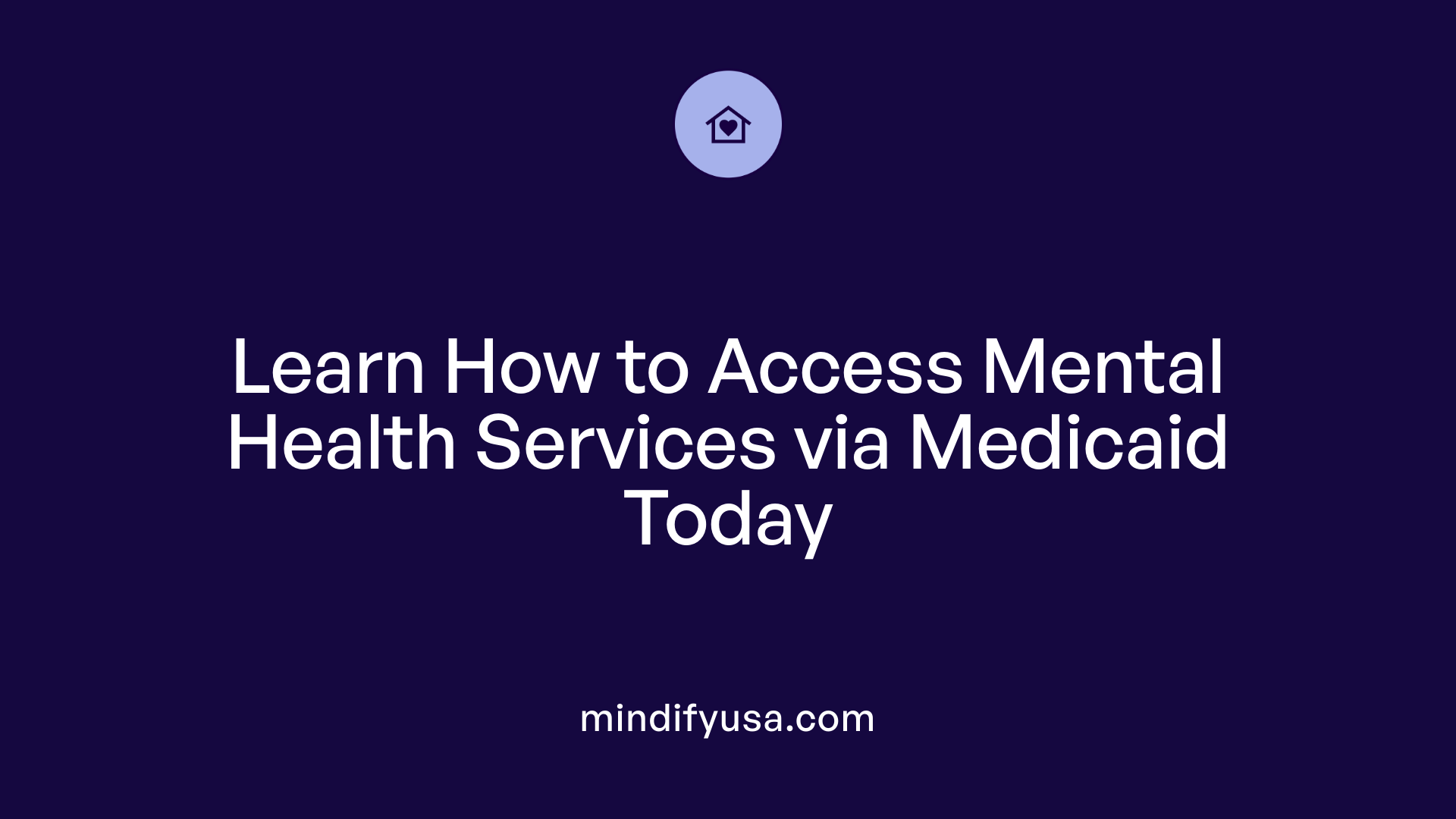
How can I access mental health services through Medicaid?
Medicaid offers comprehensive coverage for mental health and substance use disorder services, making it an essential resource for many individuals. The first step is confirming your eligibility. Enrolled beneficiaries in New York, for example, can contact their health plan or the Medicaid Helpline to verify coverage.
Once eligibility is confirmed, you can search for providers accepting Medicaid. This involves using tools like the SPIDER Database or contacting your managed care plan directly. Many clinics and health centers, including community clinics and university programs, accept Medicaid and often offer outpatient psychotherapy, medication management, and crisis intervention services.
Medicaid covers a wide range of behavioral health services, including inpatient care, outpatient therapy, medication-assisted treatment, and substance use disorder treatments. Access might be through Managed Care Organizations (MCOs), which also provide plans like the Health and Recovery Plan (HARP) for those with serious mental health or substance use needs.
If you experience a mental health crisis, immediate support is available. In New York, you can call the CARES line at 1-800-345-9049 for a 24/7 mobile crisis response service. Additionally, primary care providers, school social workers, or pediatricians can provide referrals to mental health specialists.
Be aware that some services might require prior authorization or referrals, depending on your specific plan. It’s advisable to check with your provider or plan for detailed coverage options and any potential costs, as some beneficiaries face challenges in finding new or available providers.
Utilizing resources like the SAMHSA website or contacting local health centers can also help locate mental health professionals close to you. Remember, while coverage is extensive, provider availability and state-specific policies can affect access.
For more detailed guidance, searching online with terms like "How to find Medicaid mental health providers and navigate coverage options" can provide tailored information fitting your location and needs.
Coverage Extent and Types of Mental Health Services in Medicaid
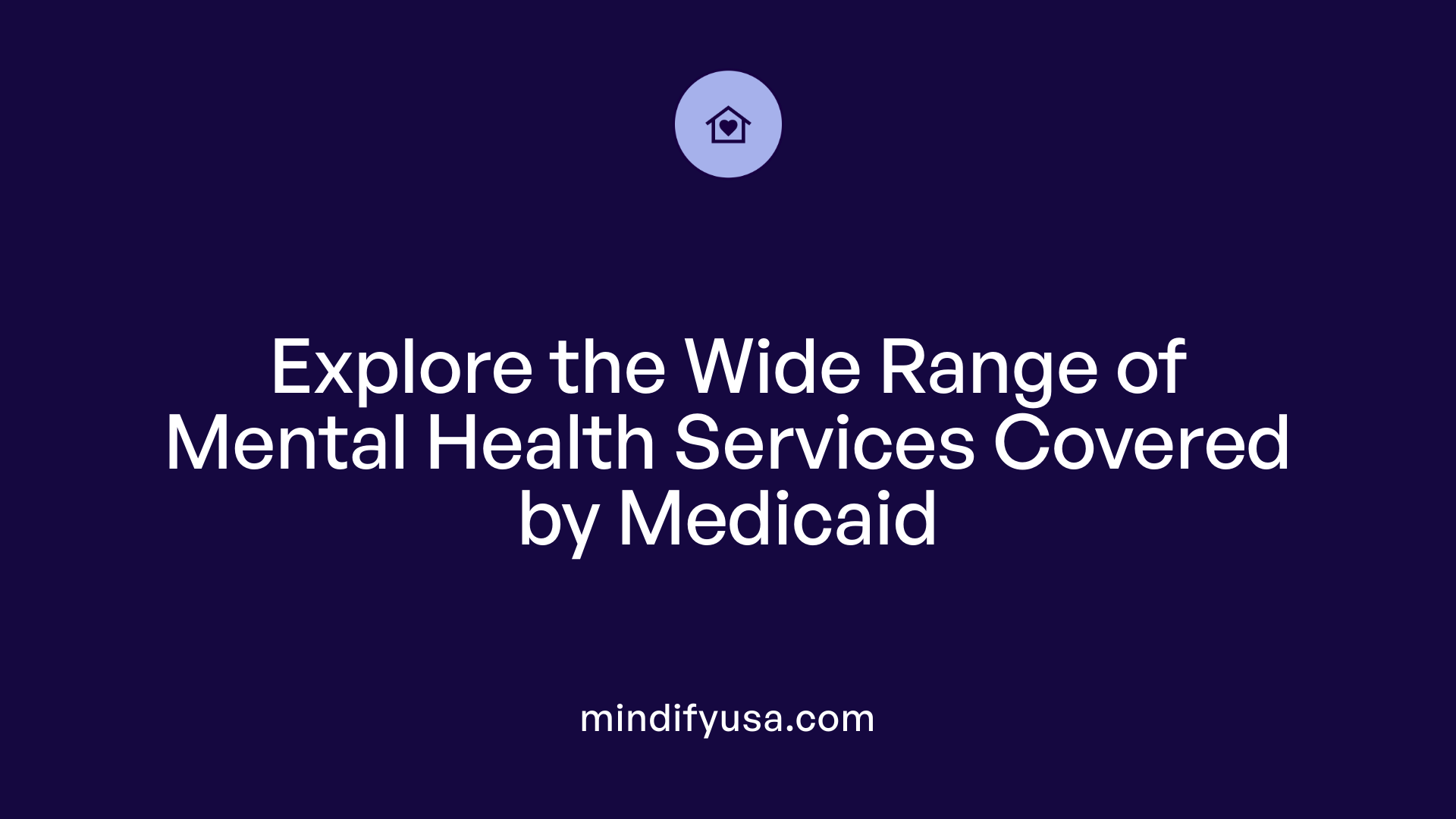
What mental health services are covered by Medicaid?
Medicaid provides a broad spectrum of mental health services designed to support individuals with various mental health conditions. These include outpatient therapy sessions, counseling, inpatient and outpatient psychiatric care, crisis intervention, and substance use disorder (SUD) treatments.
Licensed professionals, such as psychiatrists, psychologists, social workers, and marriage and family therapists, deliver many of these services. They can be accessed through community clinics, hospitals, or federally qualified health centers. Medicaid also offers specialized services like targeted case management, residential treatment for children under the EPSDT benefit, intensive behavioral health programs, and telehealth options to increase access.
The scope of covered services can differ depending on state-specific policies, Medicaid waivers, and the provisions outlined in the Medicaid State Plan. Nevertheless, the focus remains on community-based, recovery-oriented care that emphasizes early intervention and tailored treatment plans.
Federal laws like the Mental Health Parity and Addiction Equity Act aim to ensure that mental health benefits are comparable to physical health services. Overall, Medicaid strives to facilitate comprehensive, accessible mental health support to promote recovery and well-being for its enrollees.
Finding Medicaid-accepting Providers and Network Maps
If you are enrolled in Medicaid and need mental health services, locating providers who accept Medicaid is an essential step. Start by visiting your state’s Medicaid website, where many programs provide detailed provider directories. These directories often have search filters that allow you to find mental health professionals within your area who accept Medicaid insurance. For example, some states list in-network providers specifically for mental health and substance use disorder treatment.
In addition to official Medicaid websites, regional mental health programs and community health centers can offer valuable support. These organizations typically work closely with Medicaid and can recommend in-network providers or clinics that accept your coverage. Community health centers are a great resource for affordable care and often have staff experienced in navigating Medicaid services.
Online search tools are another convenient option. Several platforms and directories list healthcare professionals, including psychiatrists, counselors, and therapists, who accept Medicaid. Using these tools, you can filter your search by location, specialty, and patient acceptance status. Many states also have dedicated mental health portals that connect patients with appropriate providers.
Ask your primary care provider or a healthcare navigator for assistance, especially if you're unsure where to begin. They can help you identify suitable providers and make appointments. Also, consider reaching out to regional behavioral health organizations, which often serve as coordinators for mental health care and can guide you toward in-network services.
For immediate guidance or urgent support, the 988 Colorado Mental Health Line is available 24/7 and can help you find nearby mental health providers accepting Medicaid. This service ensures that help is accessible whenever you need it.
To summarize, finding Medicaid-accepting mental health providers involves exploring online directories, contacting regional programs, and utilizing community resources. Keeping a list of providers and verifying their acceptance of Medicaid beforehand can help streamline your access to care.
Policies, Laws, and Reforms Impacting Access to Medicaid Mental Health Care
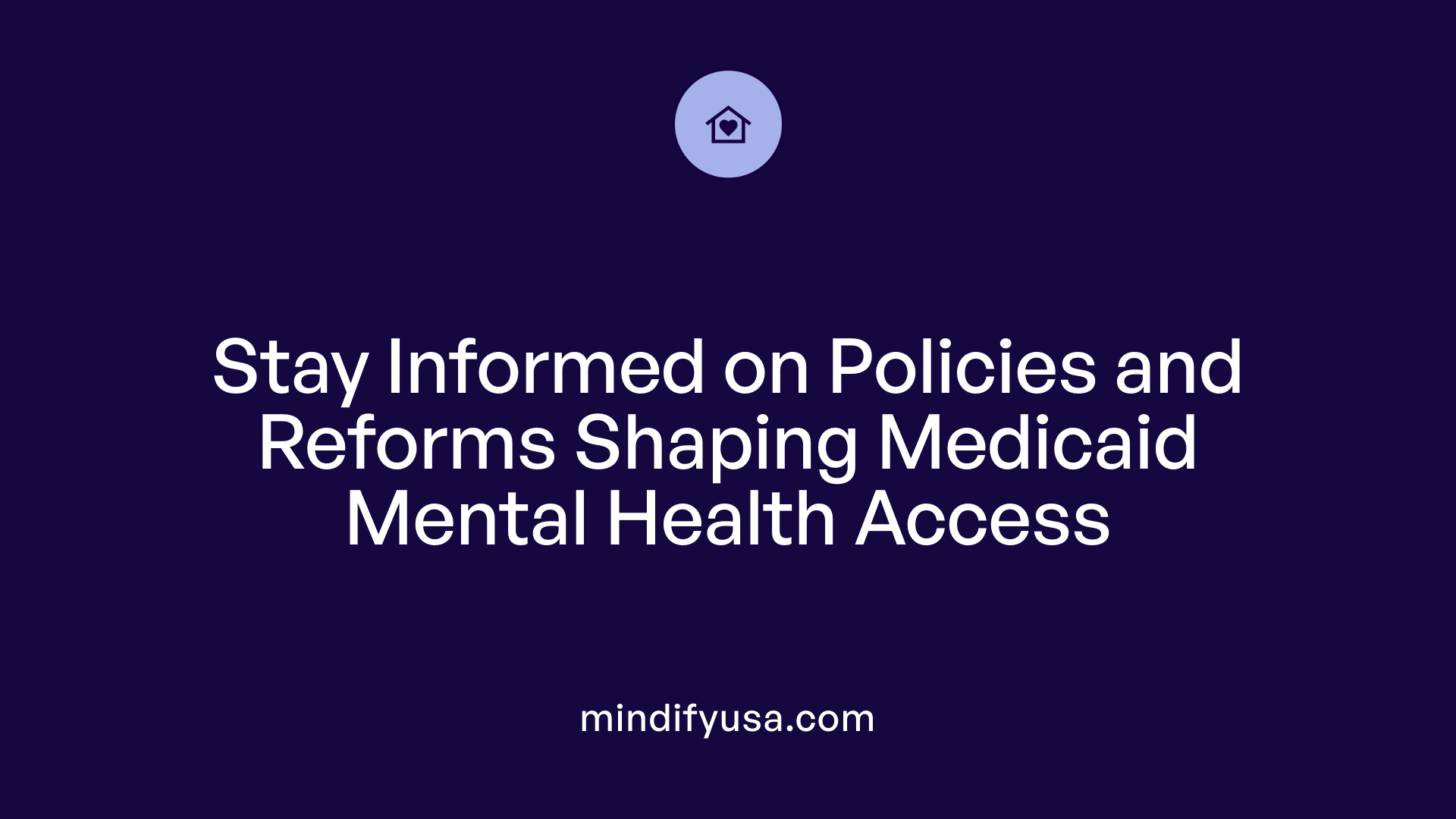
What policies, reforms, or barriers affect access to Medicaid mental health services?
Access to mental health care through Medicaid is shaped by a combination of policies, laws, and operational barriers. The expansion of Medicaid under the Affordable Care Act (ACA) has significantly increased coverage, enabling millions of low-income adults to access outpatient mental health and substance use disorder services. This expansion has led to higher utilization rates, with over half of Medicaid enrollees receiving treatment in recent years.
However, recent legislative proposals threaten this progress. Some states have considered or enacted Medicaid funding cuts that could reduce available services, especially crisis and inpatient care. These reductions might reverse positive trends, increasing reliance on emergency rooms and jails for mental health crises.
Administrative challenges also play a crucial role. Complex enrollment procedures, coverage denials, and bureaucratic errors frequently hinder vulnerable populations' access to needed care. People experiencing homelessness or living in rural areas face additional obstacles, such as a shortage of providers accepting Medicaid and geographical barriers.
Funding issues compound these challenges. Many mental health agencies and community clinics operate on limited budgets, and low provider reimbursement rates discourage many healthcare professionals from accepting Medicaid. This results in provider shortages, long wait times—sometimes over a month—and reduced availability of specialized services.
The rise of telehealth has temporarily expanded access to behavioral health services. Yet, to sustain these benefits, states need policies that enforce mental health parity laws, ensuring equal insurance coverage for mental health and physical health. Besides, ongoing enforcement of regulations designed to expand access, reduce disparities, and improve provider participation remains critical.
Overall, while policies like Medicaid expansion and parity laws are increasing access, persistent barriers such as funding constraints, administrative hurdles, and provider shortages continue to restrict timely, equitable mental health care for Medicaid beneficiaries.
Impact of Medicaid Expansion on Mental Health Care Access and Outcomes
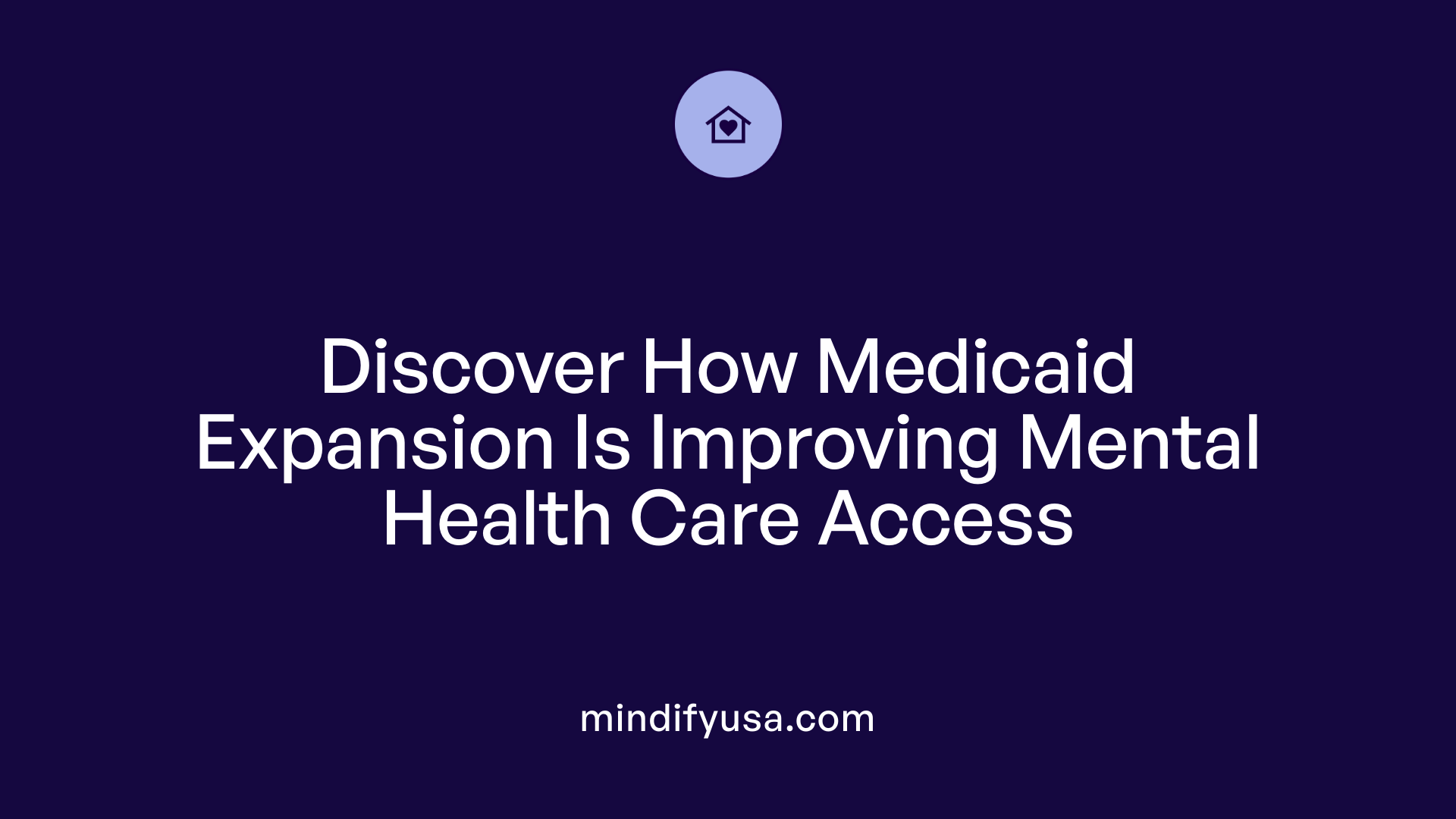
How has Medicaid expansion impacted access to mental health care?
Medicaid expansion introduced by the Affordable Care Act has significantly improved access to mental health services for many low-income individuals. By broadening eligibility, more adults now qualify based solely on income without the need for disabilities or pregnancy. This expansion has led to increased outpatient visits, allowing for more continuous and preventive care.
Expanded coverage has lowered financial barriers, making mental health and substance use disorder treatments more affordable. As a result, diagnosis rates for mental health conditions and medication usage have risen, reflecting improved detection and management.
What are the statistics on treatment utilization?
In 2023, about 59% of adult Medicaid enrollees with any mental illness received treatment, a figure comparable or higher than privately insured populations. Nearly 15 million nonelderly adults are covered by Medicaid, with over a third experiencing some form of mental health disorder.
Among youth, Medicaid covers approximately 43% of those with major depressive episodes or substance use disorders. These figures highlight increased engagement with mental health services following Medicaid expansion.
How has Medicaid expansion reduced disparities?
While expansion has increased service utilization across many racial and ethnic groups, disparities remain. Data indicate that White and Hispanic populations experienced greater increases in treatment access compared to Black populations, who still face barriers such as fewer providers accepting Medicaid.
Efforts to improve provider participation and reduce workforce shortages can help bridge these gaps.
What are the long-term health benefits?
Long-term, Medicaid expansion is linked to better health outcomes, including reduced psychological distress, decreased suicide rates, and lower hospital and emergency room visits for mental health crises. Regular access to psychological treatments and medications fosters stability, recovery, and improved quality of life.
Expansion also supports preventive care, early intervention, and comprehensive management of co-occurring conditions such as substance use disorders.
| Aspect | Improvement | Data/Details |
|---|---|---|
| Coverage rates | Increased | Nearly 30% of people with mental health issues are covered by Medicaid, up from lower previous levels |
| Treatment utilization | Higher | 59% of adults with mental illness received treatment in 2023 |
| Disparities reduction | Partial | Gains more pronounced among White and Hispanic groups, less so for Black populations |
| Long-term health | Enhanced | Better management of mental and substance use disorders, reduced crisis incidents |
| Access challenges | Persist | Shortage of providers accepting Medicaid limits care despite expanded coverage |
Medicaid expansion has proven to be a crucial element in advancing mental health care by increasing access, encouraging early intervention, and contributing to healthier long-term outcomes for vulnerable populations.
Medicaid’s Specific Coverage for Therapy, Substance Use, and Behavioral Services
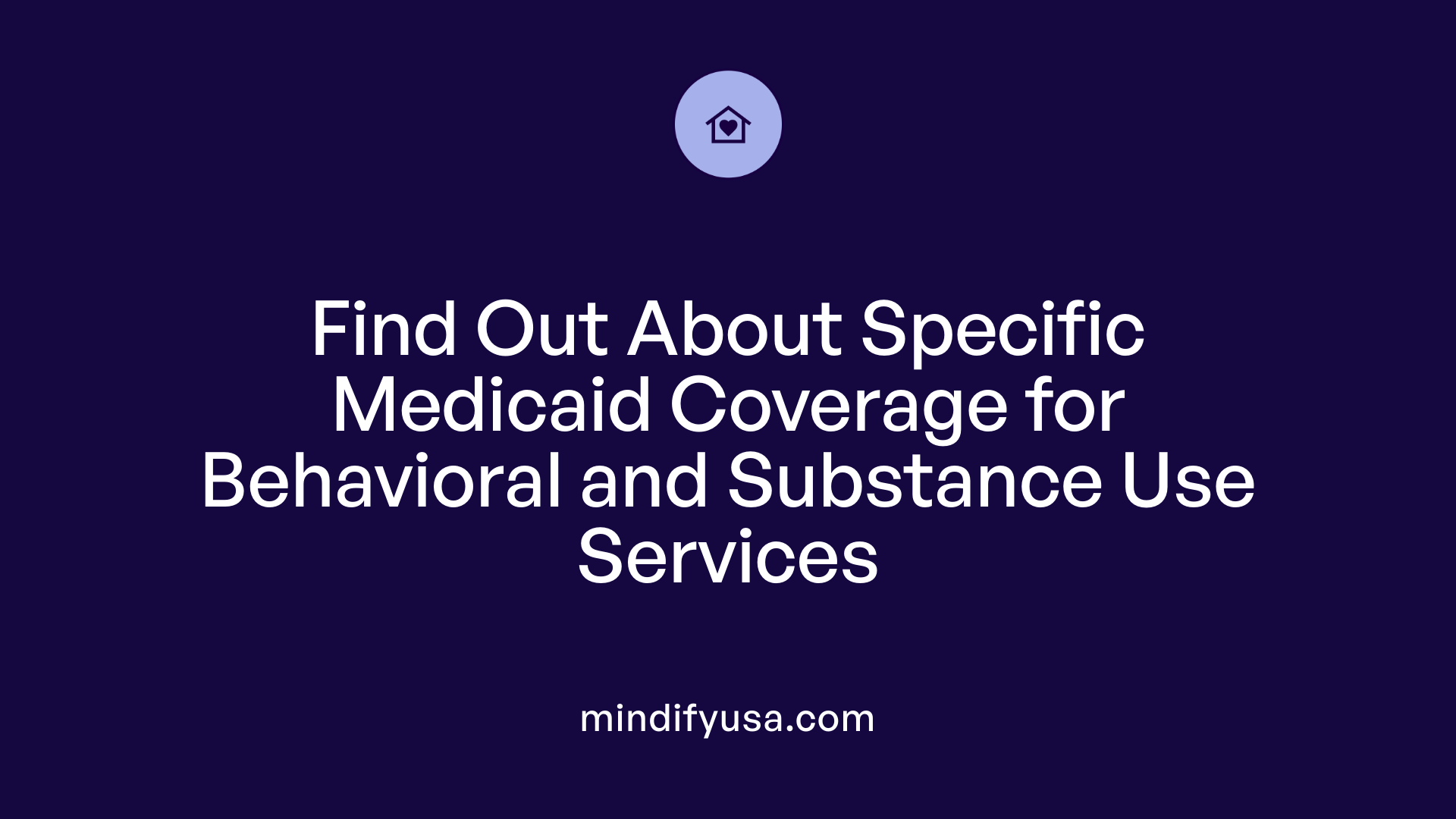
Are there specific Medicaid coverage options for therapy, behavioral health, and substance use services?
Yes, Medicaid provides tailored coverage for a range of mental health and substance use services. These include therapy and counseling for children and adults, such as outpatient psychotherapy, family therapy, and crisis intervention. Medicaid also covers inpatient and residential treatment programs, particularly for children with behavioral health conditions, and specialized services like Applied Behavior Analysis (ABA) therapy for Autism Spectrum Disorder.
In terms of substance use disorder (SUD) treatment, Medicaid covers detoxification, outpatient rehab, inpatient rehabilitative programs, and medication-assisted treatment (MAT) with FDA-approved medications like methadone, buprenorphine, and naltrexone. Many of these benefits are accessible through Medicaid Managed Care organizations, which coordinate and deliver behavioral health services, although specific coverage can differ across states.
Federal laws such as the Mental Health Parity and Addiction Equity Act (MHPAEA) require Medicaid to ensure that behavioral health benefits are on par with physical health coverage, helping improve access and reduce disparities. States can also enhance their mental health and SUD services within Medicaid, tailoring benefits to meet local needs and expanding available programs. Overall, Medicaid remains a vital resource for behavioral health care, with options adapted to individual needs, state policies, and federal regulations.
Ensuring Equitable Access to Mental Health Care
Medicaid remains a cornerstone for mental health care access in the United States, especially for vulnerable populations. While it offers extensive coverage and supports numerous programs designed to facilitate treatment and recovery, barriers such as provider shortages, policy gaps, and complex navigation still hinder equitable access. Continued reforms, enforcement of parity laws, increased provider reimbursement, expansion of network adequacy standards, and technological innovations like telehealth are crucial to overcoming these obstacles. As policies evolve, staying informed and proactive can help Medicaid beneficiaries receive the mental health care they need to lead healthier, more stable lives.
References
- [PDF] Medicaid and Behavioral Health Services - NYC.gov
- Behavioral Health Services | Medicaid
- Medicaid Behavioral Health Services - NYC.gov
- Behavioral Health Managed Care
- Governor Hochul Announces Improved Medicaid Access for ...
- Access to Mental Health Services for Adults Covered by Medicaid
- 5 Key Facts About Medicaid Coverage for Adults with Mental Illness
- NYC Medicaid Enrollees Face Access Barriers, Long Waits for ...






































































































